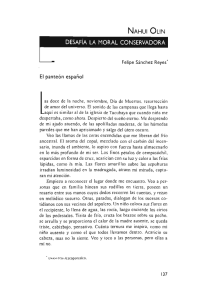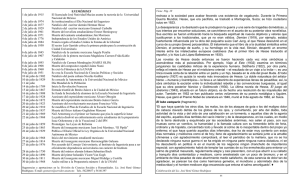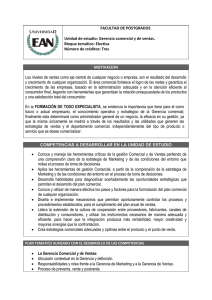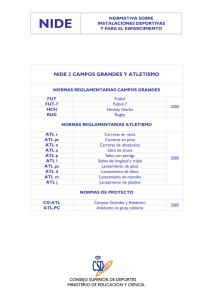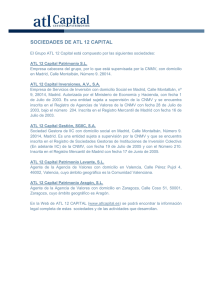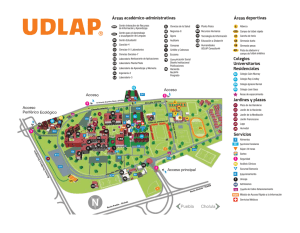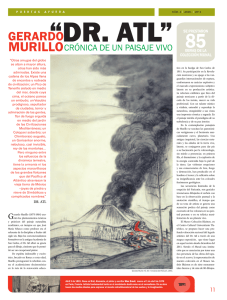OLINKA O DONDE SE CREA EL MOVIMIENTO
Anuncio
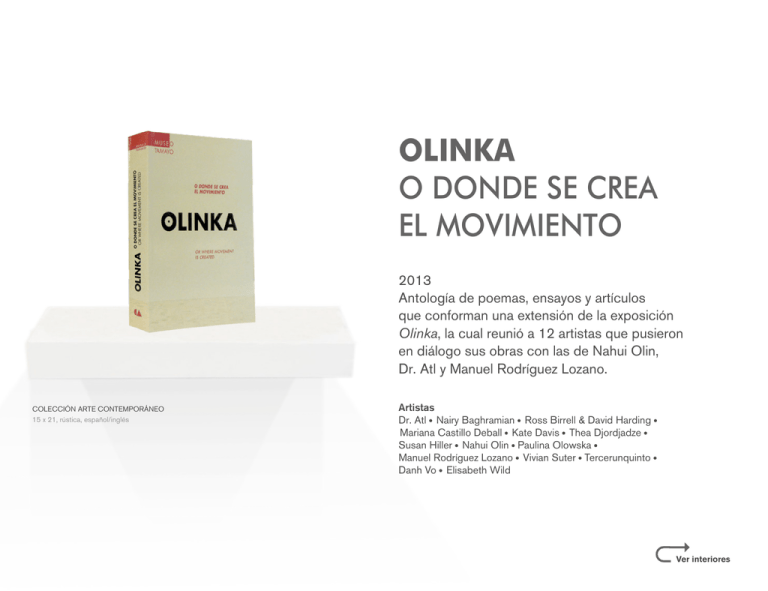
OLINKA O DONDE SE CREA EL MOVIMIENTO 2013 Antología de poemas, ensayos y artículos que conforman una extensión de la exposición Olinka, la cual reunió a 12 artistas que pusieron en diálogo sus obras con las de Nahui Olin, Dr. Atl y Manuel Rodríguez Lozano. COLECCIÓN ARTE CONTEMPORÁNEO 15 x 21, rústica, español/inglés Artistas Dr. Atl • Nairy Baghramian • Ross Birrell & David Harding • Mariana Castillo Deball • Kate Davis • Thea Djordjadze • Susan Hiller • Nahui Olin • Paulina Olowska • Manuel Rodríguez Lozano • Vivian Suter • Tercerunquinto • Danh Vo • Elisabeth Wild Ver interiores OLINKA O DONDE SE CREA EL MOVIMIENTO OR WHERE MOVEMENT IS CREATED Editado por/Edited by Adam Szymczyk & Quinn Latimer Diseño editorial/Editorial Design Cristina Paoli · Periferia Taller Gráfico Traducción/Translation Pilar Carril, Michelle Suderman Fotografía/Photography Paolo Montalvo Freud en México, Rubén Gallo, primera edición D.R. © (2013) fondo de cultura económica. Carretera Picacho-Ajusco 217, C.P. 14738, México. D.F. Esta edición consta de 1,000 ejemplares. Esta publicación es una extensión de la exposición Olinka, o donde se crea el movimiento, que se presentó en el Museo Tamayo del 11 de diciembre de 2012 al 14 de abril de 2013. This publication is an extension of the exhibition Olinka, or Where Movement Is Created, which took place at Museo Tamayo between December 11, 2012, and April 14, 2013. Agradecemos el apoyo de/Thanks for the support of Olinka, o donde se crea el movimiento/Olinka, or Where Movement Is Created. Primera edición: 2013 D.R. © 2013 Fundación Olga y Rufino Tamayo, A. C. Paseo de la Reforma y Gandhi s/n, Bosque de Chapultepec, 11580, México, D.F. ISBN: 978-607-96176-0-8 Todos los derechos reservados. Queda prohibida la reproducción parcial o total de esta obra por cualquier medio o procedimiento, comprendidos la reprografía y el tratamiento informático, la fotocopia o la grabación sin la previa autorización por escrito de la Fundación Olga y Rufino Tamayo, A. C. All rights reserved. No part of this publication may be reproduced in any form or by any means without the prior written permission of the Fundación Olga y Rufino Tamayo, A. C. Impreso en México/Printed in Mexico P-030-Interiores-Olinka-FINAL.indd 2 23/07/13 18:45 Pág. Anterior P-030-Interiores-Olinka-FINAL.indd 3 Pág. Siguiente 23/07/13 18:45 12 62 76 94 104 108 120 188 192 OLINKA, OR WHERE MOVEMENT IS CREATED Adam Szymczyk 13 MY NAME Nahui Olin 63 WHAT IS CONTEMPORARY? Giorgo Agamben 69 WITH MY BACK TO THE WORLD Nairy Baghramian 77 GERYON FELL ASLEEP SEVEN OR EIGHT TIMES ON THE WAY TO THE VOLCANO Anne Carson 95 105 DE LOS OTROS: INTIMACY AND HOMOSEXUALITY AMONG MEXICAN MEN (PREFACE) Joseph Carrier 109 PERVERSIONS Rubén Gallo TAXI Rubén Gallo 121 2666 (EXCERPT) Roberto Bolaño 189 193 P-030-Interiores-Olinka-FINAL.indd 4 23/07/13 18:45 Pág. Anterior OLINKA, O DONDE SE CREA EL MOVIMIENTO Adam Szymczyk MI NOMBRE Nahui Olin CREAR LA FUERZA (FACSÍMIL) Dr. Atl ¿QUÉ ES LO CONTEMPORÁNEO? Giorgo Agamben CON MI ESPALDA AL MUNDO Nairy Baghramian GERIÓN SE QUEDÓ DORMIDO SIETE U OCHO VECES CAMINO AL VOLCÁN Anne Carson DE LOS OTROS: INTIMIDAD Y HOMOSEXUALIDAD ENTRE LOS HOMBRES MEXICANOS (PREFACIO) Joseph Carrier PERVERSIONES Rubén Gallo TAXI Rubén Gallo 2666 (FRAGMENTO) Roberto Bolaño P-030-Interiores-Olinka-FINAL.indd 5 Pág. Siguiente 23/07/13 18:45 208 248 260 264 268 280 292 294 298 308 320 332 FROM ANARCHISM TO DEICIDE: DR. ATL AND THE ARTISTOCRACY Cuauhtémoc Medina 199 JE POSE AUX LES ARTISTES Nahui Olin 200 SKETCH OF AN UNREALIZED PROJECT HIDDEN IN THE MUSEUM Tercerunquinto 209 THE SKIN OF THE DEER Mariana Castillo Deball 249 DANS MA MAISON Nahui Olin 255 CHANGING ROOM Wojtek Pusłowski 260 A GUATEMALAN IDYLL (EXCERPT) Jane Bowles COLLAGE Elisabeth Wild 265 NAHUI OLIN: A SINGULARITY IN MEXICAN CULTURE Tomás Zurián 269 SOUNDING CATACLYSMS: THE WORK OF SUSAN HILLER Denise Robinson 293 COLLAGED TEXTS FOR OLINKA Paulina Olowska 294 THE INFINITY OF INFINITIES Nahui Olin 299 336 LIST OF WORKS 352 BIOGRAPHIES 364 CREDITS 366 ACKNOWLEDGMENTS P-030-Interiores-Olinka-FINAL.indd 6 309 321 333 23/07/13 18:45 Pág. Anterior ESQUEMA DE UN PROYECTO PARA EDIFICAR EN MÉXICO UN CENTRO INTERNACIONAL DE INVESTIGACIONES CIENTÍFICAS (FACSÍMIL) Dr. Atl DEL ANARQUISMO AL DEICIDIO: EL DR. ATL Y LA ARTISTOCRACIA Cuauhtémoc Medina POSO PARA LOS ARTISTAS Nahui Olin EL FUTURO DE LA ESPECIE (FACSÍMIL) Dr. Atl BOCETO DE PROYECTO NO REALIZADO ESCONDIDO EN EL MUSEO Tercerunquinto LA PIEL DEL VENADO Mariana Castillo Deball EN MI CASA Nahui Olin IDILIO EN GUATEMALA (FRAGMENTO) Jane Bowles COLLAGE Elisabeth Wild NAHUI OLIN: UNA SINGULARIDAD EN LA CULTURA DE MÉXICO Tomás Zurián CATACLISMOS SONOROS: LA OBRA DE SUSAN HILLER Denise Robinson COLLAGE DE TEXTOS PARA OLINKA Paulina Olowska EL INFINITO DE LOS INFINITOS Nahui Olin 337 LISTA DE OBRA 353 BIOGRAFÍAS 364 CRÉDITOS 365 AGRADECIMIENTOS P-030-Interiores-Olinka-FINAL.indd 7 Pág. Siguiente MADRE, LA DE LOS PRIMORES Sor Juana Inés de la Cruz 23/07/13 18:45 La arena que cubre la pirámide de Bronce, es la arena de un desierto que aterra —y cuando se levanta, pesa como una ola inmensa que aplasta— y va subiendo hasta cubrir el bronce de la pirámide —que no tiene espíritu— Y su materia va sepultándose sin defensa alguna bajo la fuerza de la arena de un desierto que aterra. —De un desierto que ocupa un ínfimo espacio en un enorme continente, de un desierto que quema la materia que no tiene espíritu. —La materia que va sepultando la arena que cubre la pirámide de Bronce. Nahui Olin, “La arena que cubre la pirámide de Bronce” 9 P-030-Interiores-Olinka-FINAL.indd 8 23/07/13 18:45 Pág. Anterior P-030-Interiores-Olinka-FINAL.indd 9 Pág. Siguiente 23/07/13 18:45 I dreamed I was a member of an exploring party in Mexico. After crossing a high, primeval jungle, we came upon a system of aboveground caves in the mountains where an order had survived from the time of the first missionaries till now, its monks continuing the work of conversion among the natives. In an immense central grotto with a Gothically pointed roof, mass was celebrated according to the most ancient rites. We joined the ceremony and witnessed its climax: toward a wooden bust of God the father fixed high on the wall of the cave, a priest raised a Mexican fetish. At this the divine head turned thrice in denial from right to left. Soñé que era integrante de una expedición en México. Después de atravesar una selva virgen de árboles muy altos, desembocamos en un sistema de cuevas excavado al pie de una montaña, donde, desde la época de los primeros misioneros, se había mantenido una orden cuyos hermanos proseguían su labor de conversión entre los indígenas. En una inmensa gruta central, rematada por una bóveda gótica, se estaba celebrando un oficio divino según un rito antiquísimo. Al acercarnos, pudimos presenciar su momento culminante: un sacerdote elevaba un fetiche mexicano ante un busto de madera de Dios Padre, colocado muy alto, en una de las paredes de la gruta. En ese instante, la cabeza del dios se movió negando tres veces de derecha a izquierda. Walter Benjamin, “Mexican Embassy” in One-Way Street Walter Benjamin, “Embajada mexicana” en One-Way Street 10 P-030-Interiores-Olinka-FINAL.indd 10 11 23/07/13 18:45 Pág. Anterior P-030-Interiores-Olinka-FINAL.indd 11 Pág. Siguiente 23/07/13 18:45 OLINKA, OR WHERE MOVEMENT IS CREATED OLINKA, O DONDE SE CREA EL MOVIMIENTO ADAM SZYMCZYK ADAM SZYMCZYK We live in a world populated by structures – a complex mixture of geological, biological, social and linguistic constructions that are nothing but accumulations of materials shaped and hardened by history. —Manuel De Landa, A Thousand Years of Nonlinear History1 Vivimos en un mundo poblado de estructuras: una mezcla compleja de construcciones geológicas, biológicas, sociales y lingüísticas que no son más que acumulaciones de materiales forjados y templados por la historia. —Manuel de Landa, Mil años de historia no lineal1 To the European ear, the word Olinka sounds like a female name with a gently Eastern ring to it—it could be Czech, Russian or Polish, perhaps, even a diminutive of Olga. But, in truth, Olinka is the name of a utopian city designed in the mind of Dr. Atl (Gerardo Murillo, 1875-1964), a Mexican painter, writer and thinker. But Dr. Atl was also a passionate aviator and self-proclaimed volcanologist, who famously painted a new volcano in the making—El Paricutín—during the seven years following its first eruption in 1943. (Less notably and admirably, Dr. Atl also gradually changed his political leanings from utopian socialism and the idea of “aristocracy” to fascism: he published anti-Semitic pamphlets that haunt the antiquary bookshops of Mexico City, and its readers, to this day.)2 Para el oído europeo la palabra Olinka suena como un nombre femenino con un ligero timbre europeo oriental, que podría ser checo, ruso o polaco, quizá un diminutivo de Olga. Pero lo cierto es que Olinka es el nombre de una ciudad utópica diseñada por la mente del Dr. Atl (Gerardo Murillo, 1875-1964), pintor, escritor y pensador mexicano. Sin embargo, el Dr. Atl también fue aviador apasionado y vulcanólogo autoproclamado, famoso por haber pintado el nacimiento de un nuevo volcán: el Paricutín, en los siete años posteriores a su primera erupción en 1943. (Menos notable y admirable, el Dr. Atl además cambió gradualmente sus inclinaciones políticas al socialismo utópico y la idea de la “aristocracia” del fascismo: publicó panfletos antisemitas que rondan en las librerías de viejo en la Ciudad de México y a sus lectores, hasta el día de hoy.)2 Manuel De Landa, A Thousand Years of Nonlinear History (mit Press/Zone Books, 1997). 1 Manuel De Landa, A Thousand Years of Nonlinear History (mit Press/Zone Books, 1997). 1 See Dr. Atl, Los judíos sobre América. Un estudio sobre la penetración judaica en EE.UU. y México, su extensión, sus consecuencias, sus similitudes con otros países (The Jews Over America: A Study on Jewish Penetration of the US and Mexico, Its Extent, Its Consequences, Its Similarities to Other Countries, 1942). 2 Véase Dr. Atl, Los judíos sobre América. Un estudio sobre la penetración judaica en EE.UU. y México, su extensión, sus consecuencias, sus similitudes con otros países (México, 1942). 2 12 P-030-Interiores-Olinka-FINAL.indd 12 13 23/07/13 18:45 Pág. Anterior P-030-Interiores-Olinka-FINAL.indd 13 Pág. Siguiente 23/07/13 18:45 Ollin is a Náhuatl word designating movement, change and, naturally, earthquakes. Nahui-Olin in the Aztec calendar is the sun of the present era, the “4-earthquake sun” that represents instability, imminent destruction and the potential for transformation. Nahui Olin was also a symbolic name that Dr. Atl gave to Mexican poet and artist Carmen Mondragón (1893-1978)—a name she used until the end of her life, even though her relationship with Dr. Atl turned out to be as short-lived as it was intense. A bohemian famed for her beauty, eccentricity and liberated lifestyle, Nahui Olin was also a model for photographers such as Edward Weston, and for painters including Diego Rivera and Dr. Atl himself. The exhibition Olinka, or Where Movement Is Created proposes a reading of history as a dynamic and ever-changing constellation of dormant or active sites. In this geological and topological interpretation, history opens not like a book, but as a chasm, a barranca suddenly split open in the middle of known things. History is an unstable terrain built on many layers and shaken by violent quakes and eruptions. A new reading of history can create a movement, like a drop of water sending concentric ripples across time, reaching toward the future while passing the present moment. Historical events and figures, materialized in monuments that may include texts, buildings and artifacts alike, resonate in unexpected ways in contemporary works of art. History has advantages and disadvantages for life; it can be used and abused in service of nationalist politics and capital, but it continues to inspire action and remains a powerful critical tool for many artists and thinkers today. There is a revolutionary aspect to things long ago buried in the past. Nostalgia points toward a future, and history is where movement is created. From the metaphor of change embodied by earthquake, we can imagine other forms of violent movement that affect us psychologically, emotionally and intellectually, and that exert an influence on social, ideological, and aesthetic dimensions of our existence—particularly in Mexico, the country ravaged by drug war and experiencing precarious life conditions, but also elsewhere. The artists in Olinka testify to this state of things through their works. Ollin es una palabra náhuatl que designa el movimiento, el cambio y, como es natural, los movimientos de la Tierra. NahuiOllin en el calendario azteca es el sol de la era actual, el “sol de los cuatro movimientos”, que representa la inestabilidad, la destrucción inminente y el potencial de transformación. Nahui Olin también fue el nombre simbólico que el Dr. Atl dio a la poetisa y artista mexicana Carmen Mondragón (1893-1978), que usó hasta el final de su vida, a pesar de que su relación con el Dr. Atl resultó ser tan breve como intensa. Bohemia, célebre por su belleza, excentricidad y estilo de vida liberal, Nahui Olin también fue modelo de fotógrafos, como Edward Weston, y de pintores, incluyendo Diego Rivera y el propio Dr. Atl. La exposición Olinka, o donde se crea el movimiento propone una lectura de la historia como una constelación dinámica y siempre cambiante de los sitios letárgicos o activos. En esta interpretación geológica y topológica, la historia no se abre como un libro, sino como un abismo, una barranca que de repente se parte en medio de las cosas conocidas. La historia es un terreno inestable construido sobre muchos estratos y sacudido por temblores y erupciones violentos. Una nueva lectura de la historia puede crear movimiento, como una gota de agua que produce ondas concéntricas a través del tiempo que se extienden hasta el futuro, pero pasan por el momento presente. Los acontecimientos y los personajes históricos, materializados en monumentos que pueden incluir por igual textos, edificios y artefactos, resuenan de formas inesperadas en ciertas obras de arte contemporáneo. La historia tiene ventajas y desventajas para la vida; se puede usar y abusar de ella cuando se pone al servicio de los políticos nacionalistas y el capital, pero continúa inspirando acción y sigue siendo una potente herramienta crítica para muchos artistas y pensadores de la actualidad. Las cosas enterradas hace mucho tiempo en el pasado tienen un aspecto revolucionario. La nostalgia apunta hacia el futuro y la historia es donde se creó el movimiento. A partir de la metáfora del cambio que representa un temblor, podemos imaginar otras formas de movimiento violento que nos afectan a nivel psicológico, emocional e intelectual, y que ejercen influencia en las dimensiones social, ideológica y estética de nuestra existencia, en particular en México, un país asolado por la guerra contra las drogas donde las condiciones de vida son precarias, pero también en otros lugares. Las obras de los artistas de Olinka son testimonio de este estado de cosas. WHERE MOVEMENT IS CREATED Where was Olinka? Perhaps it is not as important to map and detail all of the changing locations, from France to Mexico, of the city that Dr. Atl dreamt about and conceptualized in the years between the 1910s 14 Adam Szymczyk / Olinka, or Where Movement Is Created P-030-Interiores-Olinka-FINAL.indd 14 Olinka, o donde se crea el movimiento 23/07/13 18:45 Pág. Anterior P-030-Interiores-Olinka-FINAL.indd 15 Pág. Siguiente 15 23/07/13 18:45 and 1950s, as it is to understand the name that he gave it as a call for action. A city comes into existence once it is named, well before it is built: as such, a name becomes a focal point at which various individual intentions, reflections, and actual contributions begin to converge, and from which new meanings and ideas can radiate. Olinka is thus exactly “where movement is created,” or rather where dispersed movements can be brought together and slowly concentrated. Never built, Dr. Atl’s city of artists and scientists remains a stirring idea that appealed also to the artists who I invited to take part in “Olinka, or Where Movement Is Created,” on view at Museo Tamayo, in Mexico City, in the winter of 2012 and 2013. Next to Olinka-the-city, this invitation introduced Nahui Olin (1893-1978), the Mexican poet, writer, painter, and model, to name just a few of the roles that she occupied during her lifetime. Born Carmen Mondragón, she assumed her new name in 1922 at Dr. Atl’s suggestion. “Nahui Olin” is rooted in the Aztec cosmogony and signifies the renewal of the cosmic cycle in the Náhuatl language. The ambition behind “Olinka, or Where Movement Is Created” was to put Nahui Olin’s underappreciated work and the conflicted history of its reception to practical use by situating it in relation to the works made by international contemporary artists and among variety of texts that appear both in the show and the present anthology. Nahui Olin’s multifarious and much-neglected oeuvre has been saved from destruction by the Mexican art historian Tomás Zurián. Since 1978, Zurián has dedicated his life to the task of rescuing this unique figure and her body of work from oblivion, collecting Nahui Olin’s own works as well as those for which she modeled or played inspiration. Zurián’s relentless efforts have resulted thus far in Nahui Olin. Una mujer de los tiempos modernos (Nahui Olin: A Woman of Modern Times),3which he edited, and which accompanied a major survey exhibition under the same title that he curated at Estudio Diego Rivera in 1992. The book and show renewed popular and academic interest in Nahui Olin’s work and life; more recently, Patricia Rosas Lopátegui published her monumental 2011 anthology Nahui Olin: sin principio ni fin. Vida, obra y varia invención (Nahui Olin: Without Beginning or End. Life, Work, and Invention).4 The history of the reception of Nahui Olin’s work in Mexico is contained in these two publications. Nevertheless, she has remained DONDE SE CREA EL MOVIMIENTO ¿Dónde estaba Olinka? Tal vez no sea tan importante identificar y detallar todos los diferentes lugares, desde Francia hasta México, donde se ha situado la ciudad que el Dr. Atl soñó y conceptualizó entre las décadas de 1910 y 1950, como lo es entender el nombre que le dio como un llamado a la acción. Una ciudad empieza a existir una vez que tiene nombre, mucho antes de que se construya; así pues, el nombre se convierte en el punto focal en el que diversas intenciones, reflexiones y contribuciones individuales convergen, y del cual irradian nuevos significados e ideas. Por esta razón Olinka es precisamente “donde se crea el movimiento”, o mejor dicho, donde se reúnen movimientos dispersos y se concentran poco a poco. La ciudad de artistas y científicos del Dr. Atl, que nunca se construyó, sigue siendo una idea incitante que también atrajo a los artistas a quienes invité a participar en Olinka, o donde se crea el movimiento, la exposición presentada en el Museo Tamayo Arte Contemporáneo de la Ciudad de México, en el invierno de 2012 y 2013. Además de Olinka, la ciudad, esta invitación presentó a la mexicana Nahui Olin (1893-1978), poeta, escritora, pintora y modelo, sólo por mencionar algunos de los papeles que desempeñó durante su vida. Se llamaba Carmen Mondragón, pero adoptó su nuevo nombre en 1922 a sugerencia del Dr. Atl. “Nahui Olin” es un nombre arraigado en la cosmogonía azteca y significa la renovación del ciclo cósmico en lengua náhuatl. La ambición que dio origen a Olinka, o donde se crea el movimiento fue darle uso práctico a la obra poco apreciada de Nahui Olin y la conflictiva historia de su recepción; para ello, se yuxtaponen el trabajo de artistas contemporáneos internacionales y varios textos que aparecen tanto en la exposición como en la presente antología. Tomás Zurián, historiador de arte mexicano, salvó de la destrucción la obra diversa y muy abandonada de Nahui Olin. Desde 1978, Zurián ha dedicado su vida a rescatar del olvido a esta figura excepcional y su obra; formó una colección de las obras de Nahui Olin, así como de las de aquellos para los que modeló o fue fuente de inspiración. Los incansables esfuerzos de Zurián han dado por resultado hasta el momento el libro Nahui Olin. Una mujer de los tiempos modernos,3 que él mismo editó y que acompañó una importante exposición del Tomás Zurián (ed.), Nahui Olin. Una mujer de los tiempos modernos, exh. cat. Estudio Diego Rivera (Mexico: Instituto Nacional de Bellas Artes, 1992). 3 Tomás Zurián (ed.), Nahui Olin. Una mujer de los tiempos modernos, catálogo de exposición. Estudio Diego Rivera (México: Instituto Nacional de Bellas Artes, 1992). 3 Patricia Rosas Lopátegui (comp.), Nahui Olin: sin principio ni fin. Vida, obra y varia invención (Monterrey: Universidad Autónoma de Nuevo León, 2011). 4 16 Adam Szymczyk / Olinka, or Where Movement Is Created P-030-Interiores-Olinka-FINAL.indd 16 Olinka, o donde se crea el movimiento 23/07/13 18:45 Pág. Anterior P-030-Interiores-Olinka-FINAL.indd 17 Pág. Siguiente 17 23/07/13 18:45 virtually unknown outside of Mexico until now, particularly when contrasted with the renown of her male contemporaries, who are celebrated as major Mexican artists, and whose works have also been also included, in various ways, in the Museo Tamayo exhibition. These figures include Nahui Olin’s first husband, the painter Manuel Rodríguez Lozano (1896-1971); the painter and writer Dr. Atl (Gerardo Murillo, 1875-1964), her intellectual partner and lover in the early 1920s; and Salvador Novo (1904-1974), a gay poet and chronicler of Mexico City who wrote coded texts—among them a homoerotic travesty of a Nahui Olin poem—for the broadsheet El Chafirete, whose readership in the 1920s included both taxi drivers and Novo’s avantgarde entourage. The show’s title evoked Olinka, a non-place, an unrealized project for a city, as well as alluded to Nahui Olin herself, with both names having been invented by Dr. Atl. Each name finds its origin in Náhuatl and relates to violent natural events (such as earthquakes or volcanic eruptions) that are not random incidents but existentially and culturally significant ones, announcing the moments of change in cosmic cycles according to the Aztec concept of “Nahui Olin,” the fifth age of mankind. Thus both “Nahui Olin” and “Olinka” can be understood as harbingers of transformative, liminal experiences. And it this figure of trespass, crossing the threshold from the known present to the unknown future, that makes Nahui Olin a contemporary figure par excellence, and qualifies Olinka as a profoundly contemporary concept. Of course, despite the similitude of their names and originator, there are temporal as well as conceptual differences that separate Nahui-Olin-the-figure and Olinka-the-speculative-city. An unfulfilled project, Olinka remains a perfect embodiment of the transgressive ambitions inherent to the project of modernism. Similarly, Paricutín, the volcano that Dr. Atl obsessively studied and painted from its emergence in 1943 until 1950, was last seen active in 1952; being a so-called monogenetic volcano, it will never erupt again. By comparison, creations such as names, words of poets, and works of artists seem not to abide by the laws of nature that can make a volcano extinct. Words and art maintain a dormant power over time, being a source of occasional unrest and giving food for thought to other thinkers and artists decades or centuries after the works were written or produced. The exhibition at Museo Tamayo Arte Contemporáneo featured several project drafts and memoranda to the government that Dr. Atl wrote between 1952 and 1959 about Olinka and its related concepts. These included the construction of a museum of Mexican culture in 18 mismo nombre que Zurián curó en el Museo Estudio Diego Rivera en 1992. El libro y la exposición renovaron el interés popular y académico en la vida y obra de Nahui Olin; en fechas más recientes, Patricia Rosas Lopátegui publicó su antología monumental de 2011 titulada Nahui Olin: sin principio ni fin. Vida, obra y varia invención.4 La historia de la acogida que tuvo la obra de Nahui Olin en México está contenida en estas dos publicaciones. No obstante, la artista siguió siendo prácticamente una desconocida fuera de México hasta ahora, sobre todo en comparación con la fama de sus contemporáneos varones, que son considerados grandes artistas mexicanos, y cuyas obras también se han incluido, de varias maneras, en la exposición del Museo Tamayo. Entre estos personajes destaca el pintor Manuel Rodríguez Lozano (1896-1971), primer esposo de Nahui Olin; el pintor y escritor Dr. Atl (Gerardo Murillo, 1875-1964), su pareja intelectual y amante a principios de la década de1920; y Salvador Novo (1904-1974), poeta gay y cronista de la Ciudad de México que escribió textos en clave —entre ellos, una parodia homoerótica de un poema de Nahui Olin— para el periódico El Chafirete, cuyos lectores en los años veinte eran los conductores de taxi y el séquito vanguardista de Novo. El nombre de la exposición evoca a Olinka, un no lugar, un proyecto no realizado de una ciudad, pero también alude a la propia Nahui Olin, cuyos dos nombres fueron inventados por el Dr. Atl. Cada nombre tiene origen náhuatl y se relaciona con fenómenos naturales violentos (como temblores o erupciones volcánicas) que no son incidentes al azar, sino significativos en términos existenciales y culturales, que anuncian momentos de cambio en los ciclos cósmicos, según el concepto azteca de “Nahui Olin”, la quinta era de la humanidad. Así, tanto “Nahui Olin” como “Olinka” pueden entenderse como heraldos de experiencias transformadoras, liminares. Y es esta figura de paso, que cruza el umbral del presente conocido para entrar en el futuro desconocido, lo que hace a Nahui Olin un personaje contemporáneo por excelencia y convierte a Olinka en un concepto profundamente contemporáneo. Desde luego, pese a la semejanza de los nombres y orígenes, existen diferencias temporales y conceptuales que separan a Nahui Olin, la figura, de Olinka, la ciudad hipotética. Olinka, un proyecto sin realizar, sigue siendo la representación perfecta de las ambiciones transgresivas inherentes al proyecto del modernismo. Asimismo, la última vez que se observó actividad en el Patricia Rosas Lopátegui (comp.), Nahui Olin: sin principio ni fin. Vida, obra y varia invención (Monterrey: Universidad Autónoma de Nuevo León, 2011). 4 Adam Szymczyk / Olinka, or Where Movement Is Created P-030-Interiores-Olinka-FINAL.indd 18 Olinka, o donde se crea el movimiento 23/07/13 18:45 Pág. Anterior P-030-Interiores-Olinka-FINAL.indd 19 Pág. Siguiente 19 23/07/13 18:45 Bosque de Chapultepec, an idea that only came to fruition after Dr. Atl’s death, in the forms of the Museo de Antropología and Museo Tamayo, which were built in 1963-1964 and 1979-1981, respectively. Dr. Atl’s manifestos are completed by his drawing designating one possible location for Olinka in the Sierra de Santa Catarina, and another one depicting a giant sculpture carved into the rocky slope of a mountain, with some tall modern buildings scattered at the foot of the slope. The sculpture, with a waterfall plunging from its center, represents the symbol of Nahui Olin, our present “sun of the Earthquake,” in which four previous suns (of Jaguar, Wind, Rain, and Water, or Atl) are joined. Dr. Atl’s writings and drawings, presented as facsimiles of the originals from Dr. Atl’s archive held at the Fondo Reservado de la Biblioteca Nacional de México, provided a counterpoint for a group of works by Nahui Olin. Among them were several portraits (a lovely depiction of Olin’s beloved cats; an effigy of an unknown, pensive woman wearing spectacles; and the Apotheosis of her father, General Manuel Mondragón, an arms designer who patented the Saint Chamond-Mondragón 75mm gun, adorned by his daughter with small cannons and a laurel wreath), as well as a caricature of Dr. Atl and a comic strip about a journey to Nautla that Nahui Olin reported on for a magazine. This last trip was made with photographers for whom Nahui Olin modeled nude on the beach, and whom she ridiculed in her drawings while they were working on making her body immortal. This selection made from Nahui Olin’s oeuvre is incomplete by choice, though many of her works known from publications remain difficult or impossible to locate. Her body of work is still not recognized as part of the Mexican national heritage, to which the works of Dr. Atl belong. Nevertheless, in the exhibition such limited offerings became an advantage; they open up ways of reading the oeuvre without canonizing it as yet another dutiful “masterpiece” (see the title of Dr. Atl’s recent retrospective at Museo Colección Blaisten, which boasted a doorstopper volume of Obras maestras). Thus something of Nahui Olin’s stormy yet nimble passage through the art scene of Mexico has been preserved, hopefully, in the way that other works in the show addressed her work and life. Consider Portrait of the Artist—Indoor (2012), Paulina Olowska’s painting representing a slender silhouette of a model. Borrowed from a 1970s-era photograph by Norman Parkinson, the figure is retrospectively impersonating Nahui Olin in an elegant salon or boudoir, with a cat seated on an armchair and some of her known paintings hanging on the wall behind. Likewise, Portrait of the Artist—Outdoor (2012), offered another possible avatar of Nahui Olin, this time a different model from a Parkinson photograph, 20 Paricutín, el volcán que el Dr. Atl estudió obsesivamente y pintó desde su formación en 1943 hasta 1950, fue en 1952; como se trata de uno de los llamados volcanes monogenéticos, nunca volverá a hacer erupción. En comparación, las creaciones, como los nombres, las palabras de los poetas y las obras de los artistas, no parecen seguir las leyes de la naturaleza que hacen que un volcán se extinga. Las palabras y el arte conservan un poder latente sobre el tiempo, son lo que provoca inquietud de vez en cuando y alimenta el pensamiento de otros pensadores y artistas décadas o siglos después de haberse escrito o producido. La exposición del Museo Tamayo presenta varios bocetos de proyectos y cartas dirigidas a autoridades gubernamentales que el Dr. Atl escribió entre 1952 y 1959 acerca de Olinka y sus conceptos relacionados. Estos incluían la construcción de un museo de cultura mexicana en el Bosque de Chapultepec. Esta idea se convirtió en realidad después de la muerte del Dr. Atl en la forma del Museo de Antropología y el Museo Tamayo, que se construyeron entre 19631964 y 1979-1981, respectivamente. Los manifiestos del Dr. Atl se complementan con un dibujo que designa un posible lugar para la construcción de Olinka en la Sierra de Santa Catarina, y otro que representa una escultura gigantesca tallada en la ladera rocosa de una montaña y algunos edificios modernos altos dispersos al pie de la montaña. La escultura, de cuyo centro cae una cascada, representa el símbolo de Nahui Olin, nuestro actual “sol del Temblor de tierra”, en el que confluyen los cuatro soles anteriores (del Jaguar, el Viento, la Lluvia y el Agua, o Atl). Los escritos y los dibujos del Dr. Atl, presentados como facsímiles de los originales del archivo del Dr. Atl que se conservan en el Fondo Reservado de la Biblioteca Nacional de México, constituyen un contrapeso al grupo de obras de Nahui Olin. Entre ellas figuran varios retratos (una bella interpretación de los amados gatos de Olin; una efigie de una mujer desconocida con anteojos en actitud pensativa; y la Apoteosis de su padre, el general Manuel Mondragón, militar que ideó y patentó el cañón Saint Chamond-Mondragón de 75mm, adornado por su hija con cañones pequeños y una guirnalda de laurel), así como una caricatura del Dr. Atl y una tira cómica sobre un viaje a Nautla sobre el que Nahui Olin escribió para una revista. Esta última tira la hizo con fotógrafos para los que Nahui Olin posó desnuda en la playa y a quienes ridiculizó en sus dibujos mientras ellos trabajaban en la inmortalización de su cuerpo. Esta selección de la obra de Nahui Olin está incompleta a propósito, aunque muchas de sus obras que se conocen gracias Adam Szymczyk / Olinka, or Where Movement Is Created P-030-Interiores-Olinka-FINAL.indd 20 Olinka, o donde se crea el movimiento 23/07/13 18:45 Pág. Anterior P-030-Interiores-Olinka-FINAL.indd 21 Pág. Siguiente 21 23/07/13 18:45 Paulina Olowska, Retrato de la artista–exterior/Portrait of the Artist–Outdoor, 2012 El fin del espectáculo/ The End of the Spectacle, 2012 42 P-030-Interiores-Olinka-FINAL.indd 42 23/07/13 18:45 Pág. Anterior P-030-Interiores-Olinka-FINAL.indd 43 Pág. Siguiente 43 23/07/13 18:45 44 Dr. Atl, Documentos facsimilares/Facsimile documents, 1952 P-030-Interiores-Olinka-FINAL.indd 44 Nahui Olin, Mujer con anteojos/Woman with Glasses, s.f./n.d. 23/07/13 18:45 P-030-Interiores-Olinka-FINAL.indd 45 Mujer con anteojos, s.f. Óleo sobre cartón Pág. Siguiente Colección Tomás Zurián, México Pág. Anterior 45 23/07/13 18:45
